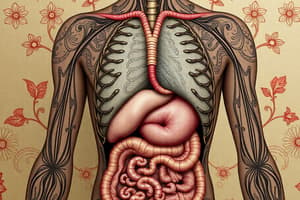Podcast
Questions and Answers
What is the primary function of mechanical digestion in the human body?
What is the primary function of mechanical digestion in the human body?
- To provide the starting point for ingestion
- To absorb and utilize nutrients effectively
- To convert complex macromolecules into simpler compounds
- To initiate the breakdown of large food particles into smaller ones (correct)
Which organ plays a crucial role in the chemical digestion process?
Which organ plays a crucial role in the chemical digestion process?
- Liver
- Pancreas (correct)
- Gallbladder
- Spleen
What is the primary purpose of ingestion in the digestion process?
What is the primary purpose of ingestion in the digestion process?
- To initiate further digestive processes (correct)
- To break down large food particles into smaller ones
- To convert macromolecules into simpler compounds
- To absorb nutrients directly into the bloodstream
Which stage of digestion involves the use of water and digestive enzymes to break down macromolecules?
Which stage of digestion involves the use of water and digestive enzymes to break down macromolecules?
What is the role of the stomach in the digestion process?
What is the role of the stomach in the digestion process?
What is the primary function of the teeth in the digestion process?
What is the primary function of the teeth in the digestion process?
Which organ serves as a storage chamber for food particles?
Which organ serves as a storage chamber for food particles?
What is the role of bile in the digestion process?
What is the role of bile in the digestion process?
In the digestion process, which organ is primarily responsible for nutrient absorption?
In the digestion process, which organ is primarily responsible for nutrient absorption?
What is the function of pepsin in the digestion process?
What is the function of pepsin in the digestion process?
Study Notes
Digestion Process in the Human Body: An Overview
Introduction
Digestion is the process by which the body breaks down food into nutrients that can be absorbed and utilized by the cells. This complex physiological process involves both mechanical and chemical processes to transform large, insoluble substances into smaller, bioavailable components. Here, we will explore the intricate mechanisms of digestion in detail, focusing on the various stages and organs involved in this vital process.
Mechanisms of Digestion
Ingestion
The first stage of digestion is ingestion, where food enters the digestive system through the mouth. Ingestion is necessary to initiate further digestive processes.
Mechanical Digestion
Mechanical digestion involves the breakdown of large food particles into smaller ones, allowing enzymes to act upon them effectively. This process begins in the mouth with chewing, or mastication, and continues with churning and mixing actions in the stomach.
Chemical Digestion
Chemical digestion converts complex macromolecules like carbohydrates, proteins, and lipids into simpler compounds that can be absorbed and utilized by the body. This process, known as hydrolysis, uses water and digestive enzymes to break down the macromolecules.
Organs Involved in Digestion
Mouth
The mouth is the starting point for ingestion, where food first enters the digestive system. The teeth grind the food into smaller pieces, while saliva produced by the salivary glands lubricates and moistens it for easier swallowing.
Stomach
The stomach serves as a storage chamber for food particles, where mechanical digestion continues through churning movements caused by smooth muscle contractions. Gastric juices containing hydrochloric acid and pepsin further aid chemical digestion within the stomach.
Small Intestine
The small intestine is responsible for most of the nutrient absorption. Enzyme-rich fluids from the pancreas and bile from the liver and gallbladder mix with partially digested food in this region, facilitating both chemical and mechanical digestion.
Large Intestine
The large intestine reabsorbs water and indigestible waste products, forming feces that are eventually excreted through defecation or elimination.
Accessory Organs
Accessory organs such as the salivary glands, liver, gallbladder, and pancreas contribute to digestion by secreting enzyme-containing fluids into the digestive tract. For example, the liver produces bile, which helps emulsify fats, making them more accessible to lipases (fat-digesting enzymes) secreted by the pancreas.
Other systems in the body like the nervous system and muscles also play essential roles in coordinating the complex processes involved in digestion, ensuring proper function throughout the entire alimentary canal.
Studying That Suits You
Use AI to generate personalized quizzes and flashcards to suit your learning preferences.
Description
Test your knowledge on the digestion process in the human body with this quiz. Explore the mechanisms of digestion, stages of the process, and the roles of various organs involved. From ingestion to absorption, this quiz covers essential information about how our body breaks down food for energy and nutrients.




